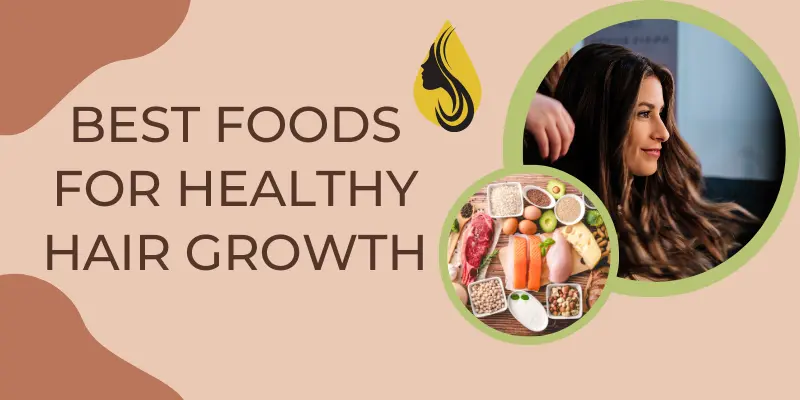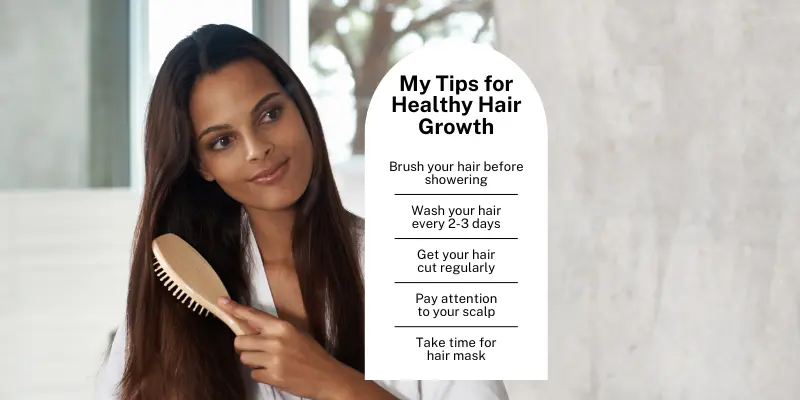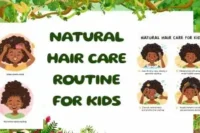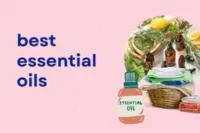Nutrient-Rich Foods for Healthy Hair Growth- Stronger, Shinier Hair Starts Here
Published: 22 Jan 2025
While shampoos and oils help on the surface, your diet has a powerful effect on how your hair grows, shines, and stays strong. If you’re struggling with thinning or lifeless strands, it might be time to look at your diet. Foods for Healthy Hair Growth are packed with the nutrients your hair needs to thrive. In this article, you’ll discover which foods can naturally boost your hair’s strength, shine, and overall health.
Key Nutrients for Hair Growth
Biotin, iron, zinc, and vitamins A, C, D, and E are key nutrients for hair growth. These essential elements support follicle strength, scalp health, and overall strand vitality, making them core components of effective hair growth tips.
Before we list the top foods, let’s look at which nutrients matter most for healthy, strong hair:
1. Protein
Hair is mostly made of keratin, a protein. Without enough protein in your diet, hair growth can slow, and strands may become weak—highlighting the importance of protein for hair repair and strength.
2. Iron
Iron helps red blood cells deliver oxygen to hair follicles. Low iron levels can cause hair thinning or loss.
3. Biotin (Vitamin B7)
Biotin is essential for making keratin, the main protein in hair. It also helps strengthen hair and promote growth.
4. Vitamins A, C, and E
- Vitamin A helps produce sebum, a natural oil that moisturizes the scalp.
- Vitamin C supports collagen production.
- Vitamin E is an antioxidant that protects hair cells from damage.
5. Zinc
Zinc aids in tissue repair and supports oil glands around follicles. Low zinc can lead to hair shedding.
6. Omega-3 Fatty Acids
Omega-3s nourish hair, add shine, and help keep the scalp hydrated.
Best Foods for Healthy Hair Growth
Eggs, spinach, nuts, and salmon are some of the best foods for healthy hair growth. They provide essential proteins, omega-3s, and vitamins that nourish hair from within.

1. Eggs
Benefits: High in protein and biotin – great for hair structure and keratin production.
How to Eat: Boiled, scrambled, in salads, or sandwiches.
2. Spinach
Benefits: Full of iron, folate, and vitamins A and C. Great for oxygen delivery to hair roots.
How to Eat: In salads, smoothies, or sautéed.
3. Fatty Fish (Salmon, Mackerel, Sardines)
Benefits: Loaded with omega-3s and vitamin D to reduce shedding and improve shine.
How to Eat: Grilled, baked, or in sandwiches.
4. Sweet Potatoes
Benefits: Rich in beta-carotene (vitamin A) for healthy scalp oils and moisture.
How to Eat: Roasted, mashed, or in soups.
5. Nuts & Seeds (Almonds, Walnuts, Chia Seeds)
Benefits: Contain zinc, vitamin E, and omega-3s for shine and strength.
How to Eat: As snacks, in oatmeal, or yogurt.
6. Greek Yogurt
Benefits: High in protein and vitamin B5, which boosts scalp circulation.
How to Eat: With fruits, honey, or in smoothies.
7. Berries (Blueberries, Strawberries, Raspberries)
Benefits: Packed with vitamin C, it helps collagen production and iron absorption.
How to Eat: In cereal, smoothies, or as snacks.
8. Avocado
Benefits: Full of vitamin E and healthy fats – great for reducing dryness and breakage.
How to Eat: On toast, in salads, or blended.
9. Lean Meats (Chicken, Turkey)
Benefits: Great source of protein and iron for follicle health.
How to Eat: Grilled or baked in wraps, salads, or bowls.
10. Beans & Lentils
Benefits: Provide protein, iron, zinc, and biotin – essential for growth and strength.
How to Eat: In soups, curries, or salads.
11. Carrots
Benefits: High in vitamin A, supports scalp health and natural oil production.
How to Eat: Raw, roasted, or juiced.
12. Oysters
Benefits: Top source of zinc, essential for preventing hair loss.
How to Eat: Steamed, raw, or baked.
My Tips for Healthy Hair Growth
As someone who struggled with dry, lifeless hair in my early twenties, I learned that what you eat can change everything. I started eating eggs, spinach, and avocado almost daily. Within months, my hair felt fuller and had a natural shine again.

Another friend of mine, dealing with postpartum hair loss, saw great results just by adding lentils and fatty fish to her diet. Her hair slowly became thicker, and the shedding reduced drastically.
Besides food, here are some important habits:
Stay Hydrated
Drink at least 8 glasses of water daily for a healthy scalp and hydrated hair.
Avoid Heat Overload
Limit curling irons and flat irons. Use a heat protectant spray if you must style.
Sleep Well
Hair grows best when your body is rested. Aim for 7- 8 hours of sleep each night.
Manage Stress
Practice yoga, walk outside, or try deep breathing. Stress can trigger hair loss.
Talk to a Doctor About Supplements
If your diet lacks variety, a multivitamin with biotin, iron, or omega-3 may help- consult a professional first.
Conclusion
Foods for Healthy Hair Growth are the foundation of strong, beautiful strands. Healthy, beautiful hair begins with what you put on your plate. Add foods rich in protein, vitamins, and healthy fats to your routine. These nutrient-packed choices fuel hair growth, boost shine, and prevent breakage. Combine good food with healthy habits, and you’ll see your hair transform over time. Remember, consistency is the secret.”
FAQs about Foods for Healthy Hair Growth
Foods like eggs, spinach, salmon, and nuts are rich in protein, biotin, iron, and omega-3 fatty acids, which are vital for healthy hair growth. Eggs provide keratin-building protein, spinach supplies iron for blood circulation, and salmon offers essential fatty acids for scalp health. Regularly eating these foods can improve hair texture and thickness.
Yes. Increasing your intake of iron-rich and vitamin-loaded foods can reduce shedding and strengthen hair roots. Leafy greens, beans, seeds, and lean meats support follicle function. A healthy diet can also help balance hormones, which is a common cause of hair loss.
No, while biotin supports keratin production, it works best alongside other nutrients like protein, iron, zinc, and omega-3s. Relying solely on biotin may not deliver results if your diet is lacking in these other essentials. Variety is key to optimal hair health.
Hair grows slowly, so you can expect visible changes in 2–3 months with consistent, nutrient-rich eating. Initial improvements may include reduced shedding and shinier strands, followed by stronger and thicker growth over time. Patience and consistency are essential.
Whole foods are generally more effective because they contain a balance of nutrients your body can absorb efficiently. Supplements can be helpful if you have deficiencies, but they should fill gaps rather than replace a healthy, balanced diet.
Yes, dehydration can cause a dry, flaky scalp and weaken hair strands, making them more prone to breakage. Drinking enough water daily helps maintain scalp health, keeps hair flexible, and supports overall follicle function.
Both are beneficial, but fish-based omega-3s (EPA and DHA) are more bioavailable — meaning your body absorbs them more easily. Plant-based omega-3s from flaxseeds, chia seeds, and walnuts are still excellent choices, especially for vegetarians and vegans.
Most adults need around 45–60 grams of protein daily, depending on body weight and activity level. Protein is the building block of hair, so consistently meeting your needs helps produce stronger, thicker strands.
Diet can play a big role in slowing or reversing thinning, especially if caused by nutrient deficiencies. However, for the best results, you should also manage stress, improve sleep, and avoid harsh chemical treatments or excessive heat styling.
Yes, these nutrition tips benefit anyone aged 16 and above. Proper nourishment supports healthy hair at all life stages, but younger people may notice faster improvements due to more active hair growth cycles.

- Be Respectful
- Stay Relevant
- Stay Positive
- True Feedback
- Encourage Discussion
- Avoid Spamming
- No Fake News
- Don't Copy-Paste
- No Personal Attacks

- Be Respectful
- Stay Relevant
- Stay Positive
- True Feedback
- Encourage Discussion
- Avoid Spamming
- No Fake News
- Don't Copy-Paste
- No Personal Attacks





